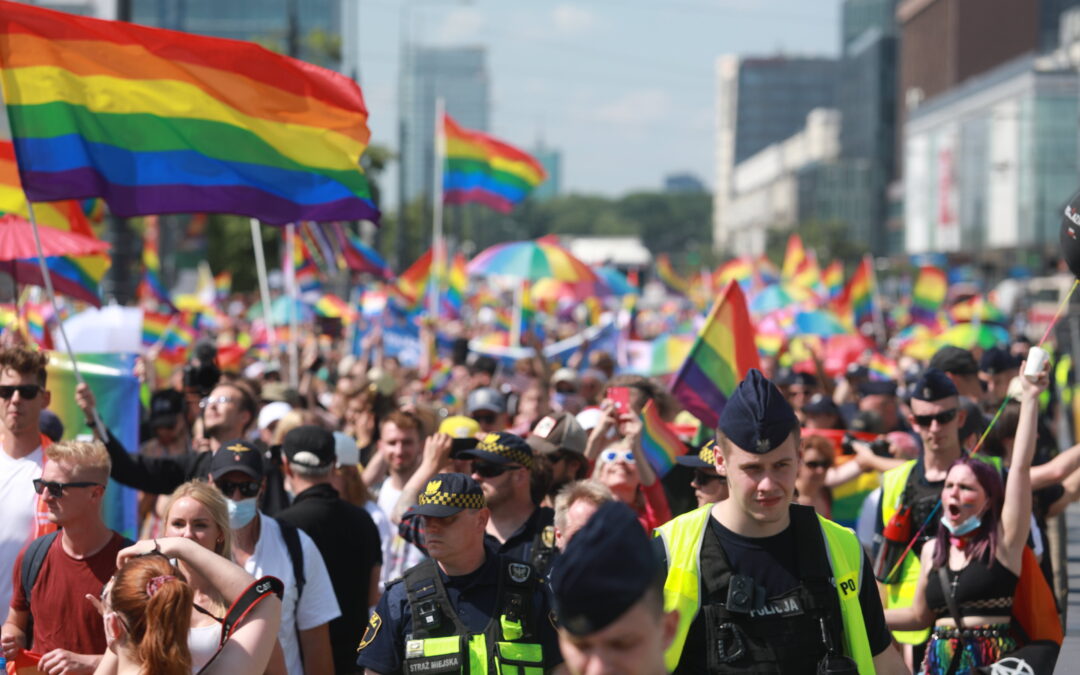Thousands gathered on Saturday in Warsaw for Poland’s – and Central Europe’s – largest annual LGBT equality parade. It was the 20th such march to take place in the city, but the first since the start of the pandemic, and only the second to be held under the patronage of the mayor, who attended the event.
The parade took place amid a long-running anti-LGBT campaign led by Poland’s government and Catholic church, which has seen the country ranked as the worst in the EU for LGBT people for the last two years.
“We will always stand by those who are weaker, whom others try to push to the margins of society, who are attacked,” said Rafał Trzaskowski, Warsaw’s mayor and a leading opposition figure, before the start of the event.
“The parade is a celebration of the LGBT+ community, but it is also a celebration of all who are tolerant, all who are smiling, all who look to the future, all who want Warsaw to be for everyone,” he added. “Here beats the heart of a smiling, open Poland.”
Kolorowa. Uśmiechnięta. Otwarta. Dla wszystkich. Taka dziś była @warszawa – i niech taka będzie codziennie. Dziękuję! #ParadaRówności pic.twitter.com/R9wGrTkzq9
— Rafał Trzaskowski (@trzaskowski_) June 19, 2021
After Trzaskowski became mayor in November 2018, he immediately lent his patronage to the event, something that his predecessor, Hanna Gronkiewicz-Waltz – though also from the centrist Civic Platform (PO) party – had refused to do.
Trzaskowski also signed an “LGBT charter” committing him to introduce policies to support sexual and gender minorities. Though he has faced some criticism for failing to follow through on all the pledges, at the march he noted that many had been introduced and that a hostel for homeless LGBT people will soon open.
A previous mayor, Lech Kaczyński, banned the parade completely for two years. His national-conservative Law and Justice (PiS) party, led by twin brother Jarosław Kaczyński, is currently in power nationally and has repeatedly condemned what it calls “LGBT ideology”.
Among the demands of this year’s parade were the introduction of legal measures to facilitate recognition of transgender people, marriage equality and the right to adoption by same-sex couples. Marchers also called for Poland’s hate speech laws to be extended to cover gender identity and sexual orientation.
“We will no longer debate our right to exist,” said the event’s organisers. “The last two years have been particularly difficult for the LGBTQIA community in Poland…A time of ‘rainbow plague’, ‘LGBT-free zones’, ‘ideology, not people’, and the arrest of [LGBT activist] Margot and many [others].”
“Today we go out onto the streets of Warsaw again – wounded, but stronger,” they declared.
The archbishop of Kraków referred to LGBT as a “rainbow plague” in a sermon. A number of local authorities, mostly under PiS control, have declared themselves free from “LGBT ideology”. President Andrzej Duda last year said that LGBT is not “people, but an ideology”.
A number of foreign embassies in Warsaw also lent their support to the event. “For tolerance and against discrimination,” tweeted Germany’s ambassador to Poland, Arndt Freytag von Loringhoven, alongside a photo of embassy staff at the parade.
Many left-wing politicians were also in attendance. Robert Biedroń, one of the leaders of The Left (Lewica), Poland’s second largest opposition party, called on other opposition groups to support his party’s proposals to strengthen LGBT rights.
Though leading figures in PO, the biggest opposition group, have often voiced a degree of support for the LGBT community, they have been reluctant to commit to specific policies. While in power between 2007 and 2015, the party introduced no major legislation to expand LGBT rights.
Such happiness and joy in Warsaw today – the epitome of resilience and solidarity. Happy #WarsawPride #ParadaRówności! #YouAreIncluded pic.twitter.com/lTjdOf3FlV
— Copenhagen 2021: WorldPride & EuroGames (@CPH2021) June 19, 2021
Main image credit: Jacek Marczewski / Agencja Gazeta

Daniel Tilles is editor-in-chief of Notes from Poland. He has written on Polish affairs for a wide range of publications, including Foreign Policy, POLITICO Europe, EUobserver and Dziennik Gazeta Prawna.




















